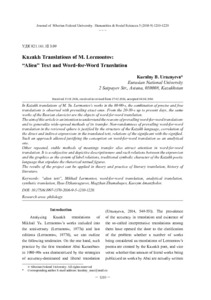Kazakh Translations of M. Lermontov: “Alien” Text and Word-for-Word Translation
Скачать файл:
URI (для ссылок/цитирований):
https://elib.sfu-kras.ru/handle/2311/20270Автор:
Urazayeva, Kuralay B.
Уразаева, К.Б.
Дата:
2016-05Аннотация:
In Kazakh translations of M. Yu. Lermontov’s works in the 80-90-s, the combination of precise and free
translations is observed with prevailing exact ones. From the 20-30-s up to present days, the same
works of the Russian classicist are the objects of word-for-word translation.
The aim of this article is an intention to understand the reasons of prevailing word-for-word translations
and to generalize wide-spread methods of its transfer. Non-randomness of prevailing word-for-word
translation in the reviewed sphere is justified by the structure of the Kazakh language, correlation of
the direct and indirect expressions in the translated text, relations of the significant with the signified.
Such an approach allowed justifying the conception on word-for-word translation as an analytical
one.
Other repeated, stable methods of meanings transfer also attract attention in word-for-word
translation. It is a subjective and depictive descriptiveness and such relations between the expression
and the graphics as the system of label relations, traditional symbolic character of the Kazakh poetic
language that stipulate the rhetorical textual figures.
The results of the project can be applied in theory and practice of literary translation, history of
literature В казахских переводах произведений М.Ю. Лермонтова 80-90-х годов наблюдается
соединение вольных и буквальных стратегий перевода, с явным преобладанием последних.
Начиная с 20-30 годов и до настоящего момента одни и те же работы русского классика
становились объектами для буквального перевода.
Целью данной статьи является стремление понять причины доминирования буквального
перевода, а также обзор основных методов его осуществления. Неслучайность
доминирования буквального перевода в рамках анализируемой сферы обусловлена
структурой казахского языка, корреляцией прямого и переносного способов выражения
в переводном тесте, отношениями между означаемым и означающим. Данный подход
позволил обосновать концепцию рассмотрения буквального перевода в качестве
аналитического.
Другие повторяющиеся устоявшиеся методы передачи значения при буквальном переводе
также заслуживают внимания. Среди них выделяются объективная и субъективная
описательность, а также такие связи между выражением и описанием, как система
этикетных отношений, традиционный характер символов в казахской поэзии с наложением
риторических фигур.
Результаты данного исследования могут быть применены в курсах по теории и практике
буквального перевода, а также истории литературы
Коллекции:
Метаданные:
Показать полную информациюСвязанные материалы
Показаны похожие ресурсы по названию, автору или тематике.
-
Translation Strategies in the Yakut Heroic Epic Olonkho: Lexical Problems (on the Nurgun Botur the Swift epic)
Dyachkovskaya, Vilena G.; Nakhodkina, Alina A.; Дьячковская, В.Г.; Находкина, А.А. (Сибирский федеральный университет. Siberian Federal University., 2016-10)The paper views translation strategies regarding to lexical issues encountered in Yakut heroic epic “Nurgun Botur the Swift” by P. A. Oyunsky. The authors give brief information on the olonkho. Different definitions to the ... -
Film Translation: to Be or Not to Be
Gorshkova, Vera E.; Горшкова, В.Е. (Сибирский федеральный университет. Siberian Federal University., 2014-02)In this era of globalization the very attitude toward the audiovisual translation (AVT) changes, subtitling has become a growingly popular method that aggravates the culturological problems of AVT of art films. The problem ... -
Дело Калипари: махинации политиков и манипуляции журналистов
Федеричи, Ф.М.; Federici, Federico M. (Сибирский федеральный университет. Siberian Federal University., 2011-10)В данной статье рассматривается case-study, изучающее отношение итальянской прессы к некоторым переводным источникам. Исследуются вопросы перевода, связанные с языковыми средствами манипулирования и затронутые журналистами ... -
Translating Linguistic Terms from English into Kazakh: Direct and Indirect Ways
Zhumabekova, Aigul K.; Жумабекова, А. К. (Journal of Siberian Federal University. Сибирский федеральный университет, 2024-08)The research aims to study methods of translating linguistic terms from English into Kazakh based on two newly translated textbooks for translation quality assessment. Linguistic-translation study of the source and ... -
Consciousness Reflecting Reality as an Epistemological Basis of the Professional Skills of a Psychologist and a Translator: Theoretical Parallels
Sokolovsky, Yaroslav V.; Соколовский, Я.В. (Сибирский федеральный университет. Siberian Federal University, 2015-12)Alexei N. Leontiev, a famous Russian developmental psychologist and the founder of activity theory, attached great importance to the concept of reflection in psychology. In this article, we intend to show the theoretical ...

